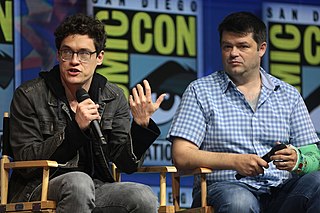A Quote by Amy Hempel
I probably have less revision than those who have that wonderful rush of story to tell - you know, I can't wait to tell you what happened the other day. It comes tumbling out and maybe then they go back and refine. I kind of envy that way of working, but I just have never done it.
Related Quotes
In this day and age, when there are so many people creating work online and writing their own shows, I wouldn't tell another actor, 'If you can do anything else go do that.' I would tell them to figure out the story they want to tell, to figure out what artists inspire you and why, and then figure out a way you can create that for yourself.
I didn't tell him I was a virgin, just that I hadn’t done it “that much.” It hurt a little more than I'd expected but in a different way, and he was nervous too and he never came. Afterwards we lay there and talked, and I could tell he was a really nice person. I commended myself for making a healthy, albeit hasty, partner choice. I really couldn't wait to tell my mom.
Although it's pretty rare that I'll get completed, finished lyrics to a song and feel like it's done, and then decide that it's not worth doing. Usually, I can tell along the way - even if it's something I've been working on for a couple of months - that it's just not going to work. Maybe I'll come back to it a few months or even a year later, or maybe it's just gone.
If you gauge how you're doing on whether somebody is responding vocally or not, you're up a creek. You can't do that; you kind of have to be inside of your work and play the scene. And tell the story every day. Tell the story. Tell the story. Regardless of how people are responding, I'm going to tell the story.
Once you understand that Goliath is much weaker than you think he is, and David has superior technology, then you say: why do we tell the story the way we do? It becomes, actually, a far more meaningful and important story in its retelling than in the kind of unsophisticated way we've done it for, I think, too long.
I think being a singer-songwriter... your job is to tell a story that other people can't really tell themselves. And I really hope that people kinda go: "This happened once and I kind of like this song because I relate to it..." So if at least one of my songs over this tour's that song, then that's really cool.
I've found great virtue in two-thirds of the way into the message; right before I'm really want to nail home a point, pausing to tell a joke or to tell a light-hearted story, because I know my audience has been working with me now for 20 or 25 minutes. And if I can get them to laugh, get oxygen into their system, it wakes up those who might be sleeping, so there's something about using a story to draw people back in right before you drive home your final point. In that case I think it's real legitimate just to use a story for story's sake.
I tell a person, "If I could go home with you tomorrow and you and I could spend the day together from maybe 8:00 to 6:00, and we went out to a restaurant at 6:30, I could tell you with a high degree of accuracy how successful you're going to be." That's huge because I'm just going to look and see, what kind of attitude do you have, how do you relate to people, how well do you prioritize your life? I'm going to see all of those things in the process of a day.
There either is or is not, that’s the way things are. The colour of the day. The way it felt to be a child. The saltwater on your sunburnt legs. Sometimes the water is yellow, sometimes it’s red. But what colour it may be in memory, depends on the day. I’m not going to tell you the story the way it happened. I’m going to tell it the way I remember it.
My father left us three times when I was between three and six. You just couldn't tell - suddenly one day he would leave and then maybe he would come back after six months without telling you why. And then maybe he would disappear again after a year and it's very difficult to take when you are four or five. You just don't know how to handle it and nobody in the family wants to talk about it. My mother didn't know how to tell us and she needed to work because we needed money to live.






































